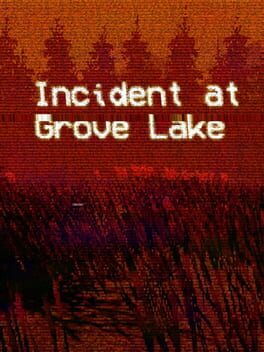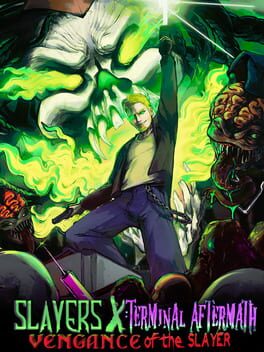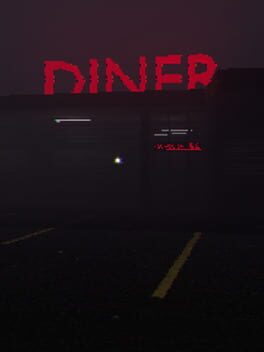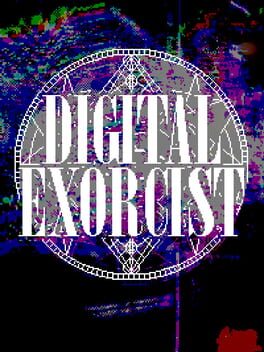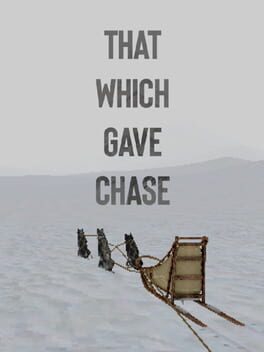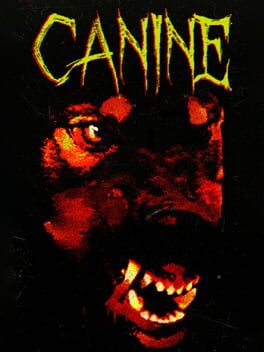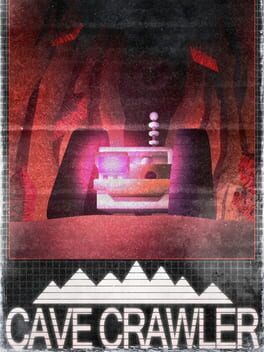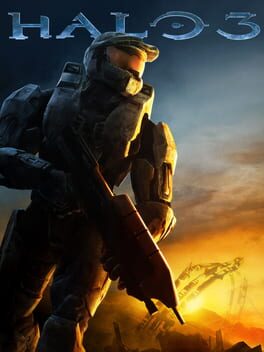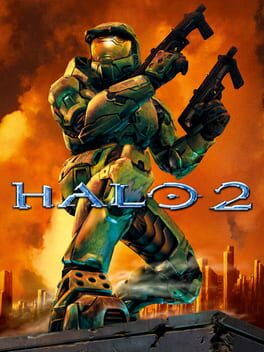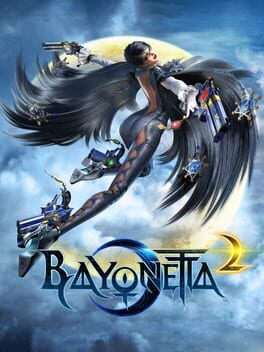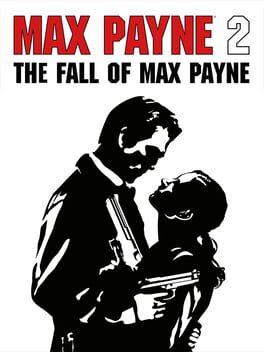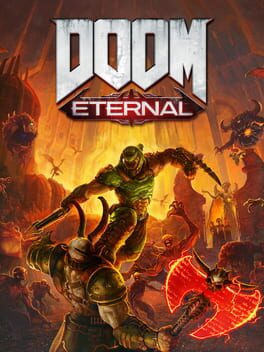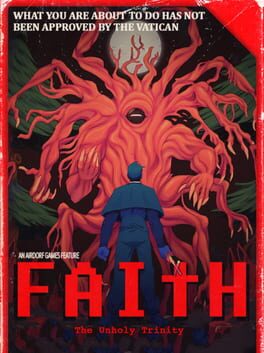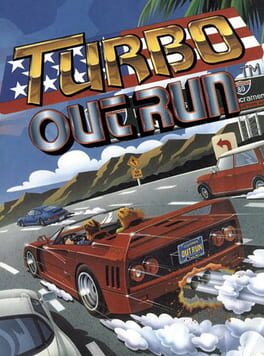metrizans
I'm going to be honest; I'm not a fan of alien abduction stories. I've just never been sold on the idea itself. However, when a piece of media is centered around this subject, I still can enjoy it when it's executed well. Incident at Grove Lake does such a great job at world-building, and setting up tension, that I still had a really good time with it, regardless of my predisposition.
This is a collection of several separate, but related vignettes revolving around alien abduction. There is a lot of care and attention put into the game world, which helps to keep the player going. Near the start, there's a radio playing a couple of broadcasts that you can choose to ignore, or sit around and listen to for a couple of minutes. There's a scene in a café with NPCs sitting about, and though not much is going on, the space feels lived in.
As I said earlier, alien abduction media doesn't do much for me on its own. However, Incident at Grove Lake succeeds at being genuinely unsettling, regardless of context. There is one particular scene right at the end where the visual on display, paired with the vocal performance, genuinely got under my skin, despite how abstract it mostly was.
It's twenty minutes long, it's free, and it's a great time. I wouldn't say it's innovative, I wouldn't say it's a must play, but I can easily recommend this one, especially if you are into the subject at hand. McGrath knocked it out of the park.
This is a collection of several separate, but related vignettes revolving around alien abduction. There is a lot of care and attention put into the game world, which helps to keep the player going. Near the start, there's a radio playing a couple of broadcasts that you can choose to ignore, or sit around and listen to for a couple of minutes. There's a scene in a café with NPCs sitting about, and though not much is going on, the space feels lived in.
As I said earlier, alien abduction media doesn't do much for me on its own. However, Incident at Grove Lake succeeds at being genuinely unsettling, regardless of context. There is one particular scene right at the end where the visual on display, paired with the vocal performance, genuinely got under my skin, despite how abstract it mostly was.
It's twenty minutes long, it's free, and it's a great time. I wouldn't say it's innovative, I wouldn't say it's a must play, but I can easily recommend this one, especially if you are into the subject at hand. McGrath knocked it out of the park.
An incredibly fun retro-styled shooter soaked in 90s American pop-culture. The level design is solid, and somehow manages to abstain from becoming labyrinthian, the bestiary is finely tuned to make every combat encounter interesting, the sprite-work makes great use of neon colors, and is overall striking, the soundtrack is crunchy and catchy as hell (I cannot stop listening to the final boss theme "Roadkilla"), its sense of humor is charming... I could go on.
Thinking about complaints, it really comes down to the fact that its missing some QOL touches that shooters have had for decades. For example, there's no weapon switch buffer coded in; weapon keys only work if Zane is finished firing his current weapon. I'm used to hitting the next weapon I want to use pre-emptively, so I had to get used to this. Key re-binding is also severely limited, and some actions are hard-coded. Though none of this was enough to ruin my experience.
All in all, I loved this game. That said, I can't help but feel it might not resonate with you if you weren't born in the late 80s, or early 90s. Maybe I'm wrong, though! For me, it really did feel like if that loud edgy kid from high school did eventually finish that game idea he kept pitching to you, and it's... honestly super charming. I can tell people are going to either love or hate this one. As for me? Slayers X stole my heart.
Thinking about complaints, it really comes down to the fact that its missing some QOL touches that shooters have had for decades. For example, there's no weapon switch buffer coded in; weapon keys only work if Zane is finished firing his current weapon. I'm used to hitting the next weapon I want to use pre-emptively, so I had to get used to this. Key re-binding is also severely limited, and some actions are hard-coded. Though none of this was enough to ruin my experience.
All in all, I loved this game. That said, I can't help but feel it might not resonate with you if you weren't born in the late 80s, or early 90s. Maybe I'm wrong, though! For me, it really did feel like if that loud edgy kid from high school did eventually finish that game idea he kept pitching to you, and it's... honestly super charming. I can tell people are going to either love or hate this one. As for me? Slayers X stole my heart.
TBD
A neat, simple little horror experience. It's about ten minutes in length if you soak everything in, but you can beat it in about one minute if you know what you're doing. Gorgeous (if not nasty) art direction, fantastic atmosphere, great pacing, and some solid scares. I also appreciate it as a Godot tech demo; pretty much shows that you can do low-poly, low-res horror joints of the same quality as stuff we've seen made in Unity or Unreal. Props to the dev!
Shady sleuthing through a nasty alleyway, a messy apartment, and an abandoned message board, as you try to solve a strange murder that's been thrown on your lap. This is a neat little adventure game with an alluring, familiar artstyle, catchy soundtrack, and some sleazy writing.
The obvious parallel here is Snatcher, which is a game I like, but didn't love. It was a game that was a little too pulpy, which held me back from falling for it, and this is pretty much the same case for me, here. That said, I still enjoyed Digital Exorcist. I think it does a great job at setting atmosphere, and visually, it is an absolute treat for fans of pixel art.
It took me about thirty minutes to complete this game, and I'm gonna be honest; I think it was the perfect length. I'm not exactly sure if I'd want more of this, as it pretty much succeeds in what it is setting out to do. Regardless, this is definitely worth experiencing for fans of cyberpunk and adventure games. I'm sure any future projects in this universe will be just as good.
The obvious parallel here is Snatcher, which is a game I like, but didn't love. It was a game that was a little too pulpy, which held me back from falling for it, and this is pretty much the same case for me, here. That said, I still enjoyed Digital Exorcist. I think it does a great job at setting atmosphere, and visually, it is an absolute treat for fans of pixel art.
It took me about thirty minutes to complete this game, and I'm gonna be honest; I think it was the perfect length. I'm not exactly sure if I'd want more of this, as it pretty much succeeds in what it is setting out to do. Regardless, this is definitely worth experiencing for fans of cyberpunk and adventure games. I'm sure any future projects in this universe will be just as good.
A fantastic thriller that sets you out in the cold wilderness with a distant, peculiar stranger who's hired you as a navigator. Your only other company is a pack of loyal dogs. Its pacing is perfect, worldbuilding is fantastic, and story is engaging. If I had to draw parallels, it definitely reminded me of Paratopic in presentation, and its themes somewhat reminded me of The Lighthouse, but it is wholly unique in what it is trying to achieve. It could be considered short; my playthrough took me an hour and thirty minutes. Though it is absolutely the perfect length to experience in one sitting.
Part of me really wants to talk about the story, but I don't want to spoil anything, honestly. This is a game worth experiencing on your own, and drawing your own conclusions from. It is a very methodical game, and though it has horror elements, it mostly plays out like a traditional adventure game; albeit in first-person. There are a few moments of tense action (which I really enjoyed), though they are a fraction of the experience. If you're don't usually like this style of game, this one wont win you over, but otherwise, you're likely to have a great time.
Part of me really wants to talk about the story, but I don't want to spoil anything, honestly. This is a game worth experiencing on your own, and drawing your own conclusions from. It is a very methodical game, and though it has horror elements, it mostly plays out like a traditional adventure game; albeit in first-person. There are a few moments of tense action (which I really enjoyed), though they are a fraction of the experience. If you're don't usually like this style of game, this one wont win you over, but otherwise, you're likely to have a great time.
2023
A fantastic little romp through an abandoned facility, as you avoid a scientific abomination out for blood, in a search to save your dog. The monster in question is a very unique concept; I'm surprised I haven't seen it done before. There's also world-building done through in-game text, to let the fear boil in your mind.
The game itself strikes a great balance of stress and release. The AI itself is no pushover, but it also isn't constantly on your neck, giving you time to catch your breath, and plan your next move. The visuals, despite being low-poly, are gorgeous, and clearly had a lot of care put into them. The soundtrack is also great, with a mix of chilling and soothing tracks to set the mood.
I can't recommend Canine enough to any fan of indie horror. Definitely worth it for the heartfelt ending alone. I wasn't expecting it, and I don't want to spoil it; hopefully you give it a chance, and discover it for yourself.
The game itself strikes a great balance of stress and release. The AI itself is no pushover, but it also isn't constantly on your neck, giving you time to catch your breath, and plan your next move. The visuals, despite being low-poly, are gorgeous, and clearly had a lot of care put into them. The soundtrack is also great, with a mix of chilling and soothing tracks to set the mood.
I can't recommend Canine enough to any fan of indie horror. Definitely worth it for the heartfelt ending alone. I wasn't expecting it, and I don't want to spoil it; hopefully you give it a chance, and discover it for yourself.
2023
A short, tense found footage horror game inspired by the "Advanced Mining Vehicle" short film. It's incredibly simplistic, but that is what makes it work so well. It's not an entirely linear experience; some objectives can be done out of order, leading to a different ending to some of the tapes. There are a couple of secrets that are pretty easy to miss, usually foreshadowing future events. It isn't a wholly original idea, by any means, but it succeeds in its execution, and is definitely worth checking out.
2023
Resident Evil 4 (2023) isn't a replacement for the 2005 classic, but it's still an incredible game in its own right. It iterates on a lot of the groundwork set by the original. It tosses away some areas, for better or worse, but throws in plenty of its own ideas. If you were to rate this on how much of a success this is as a recreation of the original, I think it's going to fail in the eyes of purists. However, to deny that RE4R doesn't come with it's own engaging complexity that is worth mastering is disingenuous.
You can finally move while aiming, and the enemies are made tougher to accommodate. The knife is greatly expanded upon, and this adds an entirely new layer to combat. Otherwise, most of the old rules are retained. It all comes together to create a clean, modern version of that beloved push and pull. This game is built on an incredible basis, so it would've taken a lot of intentional decisions by the team to mess this up.
My only complaint with the game is one regarding narrative. In trying to take itself a little more seriously, villain presence is lost, in a way? Salazar and Saddler aren't as active through your journey, since a good chunk of the banter is cut. They no longer radio you ala Andross throughout, and you lose a lot of organically built animosity in the process. I mean, they still function as villains, but I think they work a lot better in the original title. It's hard not to compare if you're familiar with their original incarnations. These villains were iconic for a reason.
All in all, the team at Capcom hit another home run, and there has not been a better time to be a RE fan. Resident Evil 2 (2019) is still my favorite of the series, but those are ridiculously high expectations to topple; again, not even the original 4 dethrones that experience, for me. It's really going to depend on your preferences as to whether or not you love this over the original, and I have a feeling over time, that split is going to even out more and more. For me, it definitely beats it out, though there will undeniably be a couple of things I'll miss, looking back.
You can finally move while aiming, and the enemies are made tougher to accommodate. The knife is greatly expanded upon, and this adds an entirely new layer to combat. Otherwise, most of the old rules are retained. It all comes together to create a clean, modern version of that beloved push and pull. This game is built on an incredible basis, so it would've taken a lot of intentional decisions by the team to mess this up.
My only complaint with the game is one regarding narrative. In trying to take itself a little more seriously, villain presence is lost, in a way? Salazar and Saddler aren't as active through your journey, since a good chunk of the banter is cut. They no longer radio you ala Andross throughout, and you lose a lot of organically built animosity in the process. I mean, they still function as villains, but I think they work a lot better in the original title. It's hard not to compare if you're familiar with their original incarnations. These villains were iconic for a reason.
All in all, the team at Capcom hit another home run, and there has not been a better time to be a RE fan. Resident Evil 2 (2019) is still my favorite of the series, but those are ridiculously high expectations to topple; again, not even the original 4 dethrones that experience, for me. It's really going to depend on your preferences as to whether or not you love this over the original, and I have a feeling over time, that split is going to even out more and more. For me, it definitely beats it out, though there will undeniably be a couple of things I'll miss, looking back.
2007
Halo 3 is a fantastic first-person shooter. Structurally, it is more an evolution (and refinement) of Halo 2, and though that implies linearity over exploration, the stages are pretty solid! Combat arenas are well thought out, vehicle segments are tolerable, and every weapon in your arsenal feels useful. Running off the beaten path usually leads to goodies, such as powerups, or Easter eggs, which breathes life into the world. Though it overall does feel like a best-of collection from the last two games, it does still provide some unique and memorable moments, and I had a great time during my playthrough.
2004
Halo 2 is a weird one for me to talk about. I didn't dislike my time with it, by any means. Mechanically, it improves on the first in a lot of ways. The writing is fleshed out, expanding the races within the Covenant beyond just mindless fodder, and into actual characters. Visually, it feels impressive for an original Xbox title, and its hard not to respect that. You can tell Bungie wasn't just pushing out a sequel for profit's sake, and had an intent with moving the series forward.
One of my favorite things about Halo: CE was the level design within two respective missions. That is, Halo, and The Silent Cartographer. When I think of Combat Evolved, these chapters are the first thing that come to mind. They embody what I appreciate about the series, which is, evolving the pre-established non-linearity of FPS before it in its own unique way. Though it wasn't the first game to replace keycard hunts in walled mazes with complex objectives on sprawling maps, it did this in its own unique way, and I absolutely loved it during my playthrough.
Halo 2 has better feeling weapons, new and unique foes, cleaner enemy AI, slicker aiming, yet all of its levels really feel like straight corridors from point A to point B. With the occasional vehicle segment stapled on, which, to be 100% honest, is my least favorite part of Halo. So while the game mostly iterates on its predecessor, it completely slacks on the part that, to me, matters most. Which is the levels!
Extravagant cutscenes in between levels are going to catch me zoned out if the actual missions don't have me engaged. I don't think this was an impossible thing to pull off, either, but it does feel like the level director was more focused on set-pieces and geometry mapping than actually building on the first's level design ethos in any meaningful way. Of course, to say Halo: CE didn't have bad levels would be disingenuous, but in that regard, Halo 2 learns all the wrong lessons from its predecessor, which is disappointing.
That said, the dogfights are fun as always. It never gets old pulse-rifling an Elite's energy shield with a Plasma Rifle, before clocking them out with an SMG. Or shotgunning a Flood Carrier's infectants into dust. The vehicles are admittedly better to handle in this one, but I don't play first-person shooters because I want to drive long distances. The newly added weapons are all great additions, and I used every single one of them. Again, I didn't dislike my time with this game. There were moments where I caught myself having fun! I just feel like Bungie neglected a really crucial aspect of the game.
It's hard for me to hate on Halo 2. With each entry I play, I do understand more and more why people love this series so much. I was estranged from Xbox growing up, 360 included, and I never really understood the appeal of Halo. Playing these games now, there is clearly a lot more under the surface, and even if I don't really agree with the heart within the Halo series, it is admittedly well-crafted, and there is a ton of potential within its world-building. I don't think I could recommend Halo 2 in good conscience, but I didn't hate my time with it. If anything, it has me excited to hop into Halo 3.
One of my favorite things about Halo: CE was the level design within two respective missions. That is, Halo, and The Silent Cartographer. When I think of Combat Evolved, these chapters are the first thing that come to mind. They embody what I appreciate about the series, which is, evolving the pre-established non-linearity of FPS before it in its own unique way. Though it wasn't the first game to replace keycard hunts in walled mazes with complex objectives on sprawling maps, it did this in its own unique way, and I absolutely loved it during my playthrough.
Halo 2 has better feeling weapons, new and unique foes, cleaner enemy AI, slicker aiming, yet all of its levels really feel like straight corridors from point A to point B. With the occasional vehicle segment stapled on, which, to be 100% honest, is my least favorite part of Halo. So while the game mostly iterates on its predecessor, it completely slacks on the part that, to me, matters most. Which is the levels!
Extravagant cutscenes in between levels are going to catch me zoned out if the actual missions don't have me engaged. I don't think this was an impossible thing to pull off, either, but it does feel like the level director was more focused on set-pieces and geometry mapping than actually building on the first's level design ethos in any meaningful way. Of course, to say Halo: CE didn't have bad levels would be disingenuous, but in that regard, Halo 2 learns all the wrong lessons from its predecessor, which is disappointing.
That said, the dogfights are fun as always. It never gets old pulse-rifling an Elite's energy shield with a Plasma Rifle, before clocking them out with an SMG. Or shotgunning a Flood Carrier's infectants into dust. The vehicles are admittedly better to handle in this one, but I don't play first-person shooters because I want to drive long distances. The newly added weapons are all great additions, and I used every single one of them. Again, I didn't dislike my time with this game. There were moments where I caught myself having fun! I just feel like Bungie neglected a really crucial aspect of the game.
It's hard for me to hate on Halo 2. With each entry I play, I do understand more and more why people love this series so much. I was estranged from Xbox growing up, 360 included, and I never really understood the appeal of Halo. Playing these games now, there is clearly a lot more under the surface, and even if I don't really agree with the heart within the Halo series, it is admittedly well-crafted, and there is a ton of potential within its world-building. I don't think I could recommend Halo 2 in good conscience, but I didn't hate my time with it. If anything, it has me excited to hop into Halo 3.
2014
Bayonetta 2 is an incredible sequel. I think all in all, the first game is probably the better game as a whole. You also won't get as much out of this without having played Bayonetta. Yet at the same time, this feels like an oddly perfect starting point for people who want to get into the series. It is a sequel, yes, but it is also a prequel. It also is a lot more accessible than Bayonetta; I'd even go as far as to say it's a nice entry point into character action games, in general.
The team behind this over at Platinum did a fantastic job. It is a lot easier, yes, but it is also no slouch. There are plenty of ways to challenge yourself here, if you so please. The spectacle is still here, and as good as ever. Minigames and quick-time events are cut down on, which I personally enjoyed. Also, a scene near the end actually had me welling up, and feeling bad for Bayonetta? Completely surprised by that. Cannot recommend this one enough.
The team behind this over at Platinum did a fantastic job. It is a lot easier, yes, but it is also no slouch. There are plenty of ways to challenge yourself here, if you so please. The spectacle is still here, and as good as ever. Minigames and quick-time events are cut down on, which I personally enjoyed. Also, a scene near the end actually had me welling up, and feeling bad for Bayonetta? Completely surprised by that. Cannot recommend this one enough.
Aesthetically, Max Payne 2 is a success. It nails the noir vibe very well. The story is pretty pulpy, but entertaining nevertheless. The visuals are a complete step up from the first game, and still look great today. That said, mechanically, it feels like a game that was pretty solid at the time of its release, but unfortunately has been improved upon by games in its genre over time.
In particular, the camera distance is a bit too far behind Max; fighting enemies in a large area often felt like picking ants off a wall with a pistol. Enemy reaction speed doesn't really account for this, and I found myself regularly killed by foes I couldn't parse amidst environmental details. I did some searching, and found a mod that allows you to edit camera distance values. I pulled in the camera in closer, above the waist, pointing over Max's shoulder, and found myself having more fun with the game. It increased my precision, at little to no cost of spatial awareness.
Out of curiosity, I tried out a first person mod, and found the transition surprisingly seamless. It makes sense that this feels almost like it was designed as an FPS. Third person games weren't as fleshed out at the time Max Payne 2 released. With a lot of the standouts in the genre, you notice that enemies aren't as snappy to react as they are in first person shooters, as player perception is inhibited in comparison. There is also usually a mix of hitscan, projectile, and melee enemies, where as this game only really has the first in the list. Though this is purely an observation, not necessarily a flaw of the game.
I also have a few nitpicks with some of Max's movement options. Crouching is more important than you might think. It shrinks Max's hitbox a considerable size, and helps steady sniper aim. That said, you can't move while crouching, and you can't toggle crouching. Really, the former I can live without, but the latter would've been appreciated. The dive mechanic looks cool, but I didn't find much use for it, and I honestly completed the game fine without it.
That said, I loved pretty much everything else about the game. The gun-feel is incredible. The arsenal is huge, and I found myself using every weapon in the game. Max's mobility options, despite my nitpicks, are pretty robust. The time-stop is an incredibly useful mechanic, and it is fun learning how to use it properly. The combat itself is perfect, and once I amended my issues with the camera, I found myself having a ton of fun with the game's various combat scenarios.
I also want to quickly shout out the Xbox port, which I played a few levels from out of curiosity. It doesn't look much worse than the PC port at its highest settings. The enemy speed is lowered; almost a bit too slow, but it does make the game a lot more manageable. That said, you no longer have the precision of a mouse, so it evens out. The control scheme is surprisingly good! Crouch can be toggled in this version, which fixes one of my earlier issues. My only complaint is no adjustable aim sensitivity, instead replaced with a button that increases your aiming speed. Overall, it's a nice port, and a good way to play this game, especially if you'd rather play with a controller!
Max Payne's writing, coming from Remedy, has always intrigued me. I am a sucker for anti-heroes, and Max isn't a perfect person. We know this. He knows this. We also know the institutions he's dedicated his life to are corrupt at the core, and I love that these games are willing to have that dialogue, steering away from being copaganda. It could be said that this game, compared to the first, focuses a lot more on character relationships than it does on any sort of subtext, but I thought it was fine. The final cutscene is a bit anticlimactic, especially after the amazing final setpiece. That said, the cast is fun, the writing is great, and I'm a sucker for the little comic-book interludes.
Overall, I enjoyed my time with Max Payne 2. It improves upon the first game in a lot of ways. It is a little dated in this day and age, but its still an enjoyable experience. The game clocks out at around 5 hours, which in my opinion, is the perfect length. If you enjoyed the first game, and wanted more of this world, give it a shot. Chances are you'll really like this one.
In particular, the camera distance is a bit too far behind Max; fighting enemies in a large area often felt like picking ants off a wall with a pistol. Enemy reaction speed doesn't really account for this, and I found myself regularly killed by foes I couldn't parse amidst environmental details. I did some searching, and found a mod that allows you to edit camera distance values. I pulled in the camera in closer, above the waist, pointing over Max's shoulder, and found myself having more fun with the game. It increased my precision, at little to no cost of spatial awareness.
Out of curiosity, I tried out a first person mod, and found the transition surprisingly seamless. It makes sense that this feels almost like it was designed as an FPS. Third person games weren't as fleshed out at the time Max Payne 2 released. With a lot of the standouts in the genre, you notice that enemies aren't as snappy to react as they are in first person shooters, as player perception is inhibited in comparison. There is also usually a mix of hitscan, projectile, and melee enemies, where as this game only really has the first in the list. Though this is purely an observation, not necessarily a flaw of the game.
I also have a few nitpicks with some of Max's movement options. Crouching is more important than you might think. It shrinks Max's hitbox a considerable size, and helps steady sniper aim. That said, you can't move while crouching, and you can't toggle crouching. Really, the former I can live without, but the latter would've been appreciated. The dive mechanic looks cool, but I didn't find much use for it, and I honestly completed the game fine without it.
That said, I loved pretty much everything else about the game. The gun-feel is incredible. The arsenal is huge, and I found myself using every weapon in the game. Max's mobility options, despite my nitpicks, are pretty robust. The time-stop is an incredibly useful mechanic, and it is fun learning how to use it properly. The combat itself is perfect, and once I amended my issues with the camera, I found myself having a ton of fun with the game's various combat scenarios.
I also want to quickly shout out the Xbox port, which I played a few levels from out of curiosity. It doesn't look much worse than the PC port at its highest settings. The enemy speed is lowered; almost a bit too slow, but it does make the game a lot more manageable. That said, you no longer have the precision of a mouse, so it evens out. The control scheme is surprisingly good! Crouch can be toggled in this version, which fixes one of my earlier issues. My only complaint is no adjustable aim sensitivity, instead replaced with a button that increases your aiming speed. Overall, it's a nice port, and a good way to play this game, especially if you'd rather play with a controller!
Max Payne's writing, coming from Remedy, has always intrigued me. I am a sucker for anti-heroes, and Max isn't a perfect person. We know this. He knows this. We also know the institutions he's dedicated his life to are corrupt at the core, and I love that these games are willing to have that dialogue, steering away from being copaganda. It could be said that this game, compared to the first, focuses a lot more on character relationships than it does on any sort of subtext, but I thought it was fine. The final cutscene is a bit anticlimactic, especially after the amazing final setpiece. That said, the cast is fun, the writing is great, and I'm a sucker for the little comic-book interludes.
Overall, I enjoyed my time with Max Payne 2. It improves upon the first game in a lot of ways. It is a little dated in this day and age, but its still an enjoyable experience. The game clocks out at around 5 hours, which in my opinion, is the perfect length. If you enjoyed the first game, and wanted more of this world, give it a shot. Chances are you'll really like this one.
2020
DOOM Eternal is a good shooter, with some incredible visuals, some solid gameplay, and satisfying sound design. Expanding on its predecessors, you go through the tried and true merry-go-round of shifting through your arsenal to take out waves of incoming demons, while trying to keep your head on. Level design is even more engaging than any DOOM game before it, with segments that feel like they're ripped out of a Zelda dungeon. Enemies are introduced that keep you from just holding left click and running around until they fall over. It's a frenetic, intense time, and I was engaged throughout its runtime.
If I were to think of issues I had with this game, it mostly boils down to some of the combat areas being a little too tight for my liking? On Ultra Violence, enemies litter the screen, and it is incredibly easy to get stuck while dancing around your foes. Some enemy waves feel a little poorly thought out. You really do only have so much chainsaw ammo, and though I think I got through encounters pretty smoothly overall, they just weren't fun to sit through, at times.
Being chased around by two Cyber-Mancubi and a Fireborne Baron at the same time, while trying to find a chance to saw an Imp for bullets and plasma, is one of the many moments that left me scratching my head. It does, at some point, feel like they're just throwing everything at you without a second thought. I think I would've rather the designers extend the number of waves with some of the last encounters, rather than bloat up singular waves. There are plenty of options within these scenarios to cheese it altogether, with both the BFG and the Crucible, but it just feels like lazy design when they are my only choice out of a situation. These are supposed to be Get-out-of-Jail-Free cards, after all.
I only argue this because ammo does feel like a finite resource, but unlike the original games, it doesn't really work, here. At the end of the day, the powerful weapons reserved for heavy hitters eat out ammo from your base weapons, so once you've taken out the big guys, you're going to have to go hunting for ammo, which I felt breaks the flow of combat. If you go about it vice versa, you won't have anyone to slice for ammo. I think even just increasing ammo reserves, or making ammo drop naturally from enemies, would've been enough to remedy this. I was playing on Ultra-Violence, so maybe this game feels a little more balanced on lower difficulties, but its definitely something I caught during my playthrough.
The less said about the story, the better. Of course, these games aren't really about the story, but the team clearly cared about it with this entry, and tried their best to flesh out the world. I think 2016 left a good basis within its critique of corporate greed, but this one gets a little too self-indulgent in the mythos of a great warrior, that will selflessly save humanity. In the original games, the Doom Marine was just a soldier who, unfortunately, got wrapped up in a bad situation, and is trying his best to get out of it. Since 2016, he's been painted more and more as this great hero who is dedicated to his people, yet in the moments where he interacts with others, he seems like the most vacant, cold individual imaginable.
Obviously, someone like him would hollow theirselves out to cope with everything going on, and I guess that's why I don't enjoy these sort of characters. Just own up to the fact that you're having your players play as an asshole, instead of hyping him up. I have no room in my heart for the Slayer. He's just a blood hungry man taking advantage of a bad situation to satisfy his penchant for violence. I wouldn't really be reading into this so much if the game wasn't regularly asking me to, but my whole time through Eternal, I felt like the game wanted me to feel some reverance for him.
There's also moments in here where the game tries to criticize things such as corporations co-opting the language of the marginalized to further their bottom line, and while its obviously a point well-made, I just don't see what's the point of having it in here. Much like the game Bioshock Infinite, it wants to critique our society, despite it not having the tact to do so in any meaningful way. id really should just leave this sort of thing for MachineGames, and put all its energy into making a stupid, pulpy, entertaining tale.
Complaints aside, I did enjoy my time with DOOM Eternal. It's gorgeous, it's engaging, and does iterate on its predecessor in fantastic ways. I just can't look the other way and say I loved everything about it. One last thing I do want to add is, its too long for its own good. 8 to 10 hours would've been perfect, but for me, it started to drag 3/4ths of the way in. I would recommend playing it on Hurt Me Plenty. You will probably end up having a better time with it.
If I were to think of issues I had with this game, it mostly boils down to some of the combat areas being a little too tight for my liking? On Ultra Violence, enemies litter the screen, and it is incredibly easy to get stuck while dancing around your foes. Some enemy waves feel a little poorly thought out. You really do only have so much chainsaw ammo, and though I think I got through encounters pretty smoothly overall, they just weren't fun to sit through, at times.
Being chased around by two Cyber-Mancubi and a Fireborne Baron at the same time, while trying to find a chance to saw an Imp for bullets and plasma, is one of the many moments that left me scratching my head. It does, at some point, feel like they're just throwing everything at you without a second thought. I think I would've rather the designers extend the number of waves with some of the last encounters, rather than bloat up singular waves. There are plenty of options within these scenarios to cheese it altogether, with both the BFG and the Crucible, but it just feels like lazy design when they are my only choice out of a situation. These are supposed to be Get-out-of-Jail-Free cards, after all.
I only argue this because ammo does feel like a finite resource, but unlike the original games, it doesn't really work, here. At the end of the day, the powerful weapons reserved for heavy hitters eat out ammo from your base weapons, so once you've taken out the big guys, you're going to have to go hunting for ammo, which I felt breaks the flow of combat. If you go about it vice versa, you won't have anyone to slice for ammo. I think even just increasing ammo reserves, or making ammo drop naturally from enemies, would've been enough to remedy this. I was playing on Ultra-Violence, so maybe this game feels a little more balanced on lower difficulties, but its definitely something I caught during my playthrough.
The less said about the story, the better. Of course, these games aren't really about the story, but the team clearly cared about it with this entry, and tried their best to flesh out the world. I think 2016 left a good basis within its critique of corporate greed, but this one gets a little too self-indulgent in the mythos of a great warrior, that will selflessly save humanity. In the original games, the Doom Marine was just a soldier who, unfortunately, got wrapped up in a bad situation, and is trying his best to get out of it. Since 2016, he's been painted more and more as this great hero who is dedicated to his people, yet in the moments where he interacts with others, he seems like the most vacant, cold individual imaginable.
Obviously, someone like him would hollow theirselves out to cope with everything going on, and I guess that's why I don't enjoy these sort of characters. Just own up to the fact that you're having your players play as an asshole, instead of hyping him up. I have no room in my heart for the Slayer. He's just a blood hungry man taking advantage of a bad situation to satisfy his penchant for violence. I wouldn't really be reading into this so much if the game wasn't regularly asking me to, but my whole time through Eternal, I felt like the game wanted me to feel some reverance for him.
There's also moments in here where the game tries to criticize things such as corporations co-opting the language of the marginalized to further their bottom line, and while its obviously a point well-made, I just don't see what's the point of having it in here. Much like the game Bioshock Infinite, it wants to critique our society, despite it not having the tact to do so in any meaningful way. id really should just leave this sort of thing for MachineGames, and put all its energy into making a stupid, pulpy, entertaining tale.
Complaints aside, I did enjoy my time with DOOM Eternal. It's gorgeous, it's engaging, and does iterate on its predecessor in fantastic ways. I just can't look the other way and say I loved everything about it. One last thing I do want to add is, its too long for its own good. 8 to 10 hours would've been perfect, but for me, it started to drag 3/4ths of the way in. I would recommend playing it on Hurt Me Plenty. You will probably end up having a better time with it.
A minimalist horror masterpiece. Faith manages to execute dread and anxiety within an incredibly retro package, and it surprised me! Not an overly frightening game, but it definitely has its moments. Faith mainly consists of moments of exploration, but there are also combat segments that translate the over-the-top exorcisms seen in films into gameplay, and I was pretty stunned by how well it worked. I do believe this has been done before, but regardless, Faith does it very well.
This is a throwback to games of the 80s, so the art isn't necessarily amazing, but it is admirable how much it does with so little. I think the part of this game that really stands out, visually, are the rotoscoped cutscenes that play before big moments. They are lovingly crafted, and can be chilling to watch. A lot of work was put into them, and its hard not to admire them. It also fits pretty nicely with the rest of the game.
Faith, to me, feels like a lost game from over 30 years ago, that was dug up and shared online. A wonderful tribute to retro home consoles, as much as it is to horror classics like The Exorcist. Give it a go if you're itching for a fun, spooky time.
This is a throwback to games of the 80s, so the art isn't necessarily amazing, but it is admirable how much it does with so little. I think the part of this game that really stands out, visually, are the rotoscoped cutscenes that play before big moments. They are lovingly crafted, and can be chilling to watch. A lot of work was put into them, and its hard not to admire them. It also fits pretty nicely with the rest of the game.
Faith, to me, feels like a lost game from over 30 years ago, that was dug up and shared online. A wonderful tribute to retro home consoles, as much as it is to horror classics like The Exorcist. Give it a go if you're itching for a fun, spooky time.
1989
In interviews with Yu Suzuki regarding the development of Out Run, he often discusses how he envisioned a game with a more cinematic flair. A cross-country road-trip with a little bit of a narrative, akin to the game's film inspiration, The Cannonball Run. Due to hardware restrictions, the team could not achieve his vision. Though in turn, they focused on fleshing out the parts of the game that made it fun. As a result, I think it ended up a better game.
Turbo Outrun is the sequel to the 1986 classic. It trades away tight, minimalist design for a sprite-scaling spectacle. Weather changes within certain areas, the drive is now full of crowds, vistas are more detailed, more complex, and a variety of obstacles now litter the interior of the road. Its to the point where the 68000 chips completely choke at certain points during a playthrough, bringing the experience to a near-halt. There are definitely better games released by Sega down the road using this visual effect, though Turbo Outrun is still a graphically impressive game, in my opinion.
Character interactions are no longer limited to finish screens. For starters, your partner is now active throughout your drive. At the start of each course, she will praise you for your victory, or leave you for your rival in the race. A long haired, bearded blonde man who is constantly getting in your way, making snide remarks as he leaves you in the dust. The premise is unfortunately dated, as your partner is now even more of an object than in the first game, but the added goal does at least make races more interesting.
It definitely feels the intent here was possibly to mimic the original's design document closely. Interestingly, most of the team is fresh blood, possibly fans of the first who were inspired by the original vision. Yu doesn't seem to be heavily involved with the project, and only about two names from the Out Run team appear in its credits. This doesn't necessarily mean this game could never be as good as the first, of course. So, mechanically, how does it stand up?
Controls are about as good as the first game. I sort of felt they were worse initially, but after playing for a while, I realized there's just a lot more to account for. Wet pavement, oil slicks, and rocky roads throw off your tires traction. Barrels and road block signs occasionally litter chunks of the road, bringing your speed down with every collision. Though all in all, it is still Out Run in feel. As per usual, you want to keep at max speed unless a tight turn is coming up. In which case, you want to slam the brakes, and switch down gears, so you don't go flying off the road.
Traffic is also now more interactive, with both the rival and the newly added police car trying to knock you off balance. Though the penalty for a vehicle-to-vehicle collision is far more forgiving than the first game, possibly due to it being a more dynamic obstacle in Turbo Outrun. I actually felt encouraged to smash into rival cars, to kick them out of the race for a moment.
There's also the titular Turbo, which raises your acceleration to ridiculous levels, and sends you flying forward. As to be expected, there's a give and take with this mechanic. Use it right before a tight turn, and you'll have to slam the brakes, which doesn't necessarily result in a wasted boost, but definitely denies you of the full the advantage it could've given you. Use it twice in a row, and the engine overheats, preventing you from using it for a moment.
The main complaint I see raised against Turbo Outrun, and one I can't help but agree with, is the linearity in contrast to its prequel. In Out Run, you are always given a choice of two roads at the end of an area, which resulted in a unique experience each playthrough. In Turbo Outrun, you must drive through all sixteen courses, with little to no diversity between each playthrough. The original's radio is also thrown out; there are now preset themes for each area. I'm always itching to replay Out Run, because I can go visit locales that I haven't in a while, or tune the radio to a different station. In Turbo Outrun, once all stages and mechanics are mastered, there isn't much incentive to return to the game.
Though Turbo Outrun is undeniably a flawed sequel, I would not say it is a bad game by any means. The improvement to visuals, and the more complex mechanics thrown in definitely are interesting additions. Its undeniable that its attempt to one-up Out Run resulted in it becoming as influential as its predecessor. I'm not sure if this is the first racer with a Turbo Boost, but it only became more and more of a staple following its release. The police car was eventually experimented with in future racers, to mixed degrees of success. All in all, Turbo Outrun doesn't get close to the fun of the first, but I do believe its worth your time if you're a fan of the series.
Turbo Outrun is the sequel to the 1986 classic. It trades away tight, minimalist design for a sprite-scaling spectacle. Weather changes within certain areas, the drive is now full of crowds, vistas are more detailed, more complex, and a variety of obstacles now litter the interior of the road. Its to the point where the 68000 chips completely choke at certain points during a playthrough, bringing the experience to a near-halt. There are definitely better games released by Sega down the road using this visual effect, though Turbo Outrun is still a graphically impressive game, in my opinion.
Character interactions are no longer limited to finish screens. For starters, your partner is now active throughout your drive. At the start of each course, she will praise you for your victory, or leave you for your rival in the race. A long haired, bearded blonde man who is constantly getting in your way, making snide remarks as he leaves you in the dust. The premise is unfortunately dated, as your partner is now even more of an object than in the first game, but the added goal does at least make races more interesting.
It definitely feels the intent here was possibly to mimic the original's design document closely. Interestingly, most of the team is fresh blood, possibly fans of the first who were inspired by the original vision. Yu doesn't seem to be heavily involved with the project, and only about two names from the Out Run team appear in its credits. This doesn't necessarily mean this game could never be as good as the first, of course. So, mechanically, how does it stand up?
Controls are about as good as the first game. I sort of felt they were worse initially, but after playing for a while, I realized there's just a lot more to account for. Wet pavement, oil slicks, and rocky roads throw off your tires traction. Barrels and road block signs occasionally litter chunks of the road, bringing your speed down with every collision. Though all in all, it is still Out Run in feel. As per usual, you want to keep at max speed unless a tight turn is coming up. In which case, you want to slam the brakes, and switch down gears, so you don't go flying off the road.
Traffic is also now more interactive, with both the rival and the newly added police car trying to knock you off balance. Though the penalty for a vehicle-to-vehicle collision is far more forgiving than the first game, possibly due to it being a more dynamic obstacle in Turbo Outrun. I actually felt encouraged to smash into rival cars, to kick them out of the race for a moment.
There's also the titular Turbo, which raises your acceleration to ridiculous levels, and sends you flying forward. As to be expected, there's a give and take with this mechanic. Use it right before a tight turn, and you'll have to slam the brakes, which doesn't necessarily result in a wasted boost, but definitely denies you of the full the advantage it could've given you. Use it twice in a row, and the engine overheats, preventing you from using it for a moment.
The main complaint I see raised against Turbo Outrun, and one I can't help but agree with, is the linearity in contrast to its prequel. In Out Run, you are always given a choice of two roads at the end of an area, which resulted in a unique experience each playthrough. In Turbo Outrun, you must drive through all sixteen courses, with little to no diversity between each playthrough. The original's radio is also thrown out; there are now preset themes for each area. I'm always itching to replay Out Run, because I can go visit locales that I haven't in a while, or tune the radio to a different station. In Turbo Outrun, once all stages and mechanics are mastered, there isn't much incentive to return to the game.
Though Turbo Outrun is undeniably a flawed sequel, I would not say it is a bad game by any means. The improvement to visuals, and the more complex mechanics thrown in definitely are interesting additions. Its undeniable that its attempt to one-up Out Run resulted in it becoming as influential as its predecessor. I'm not sure if this is the first racer with a Turbo Boost, but it only became more and more of a staple following its release. The police car was eventually experimented with in future racers, to mixed degrees of success. All in all, Turbo Outrun doesn't get close to the fun of the first, but I do believe its worth your time if you're a fan of the series.
